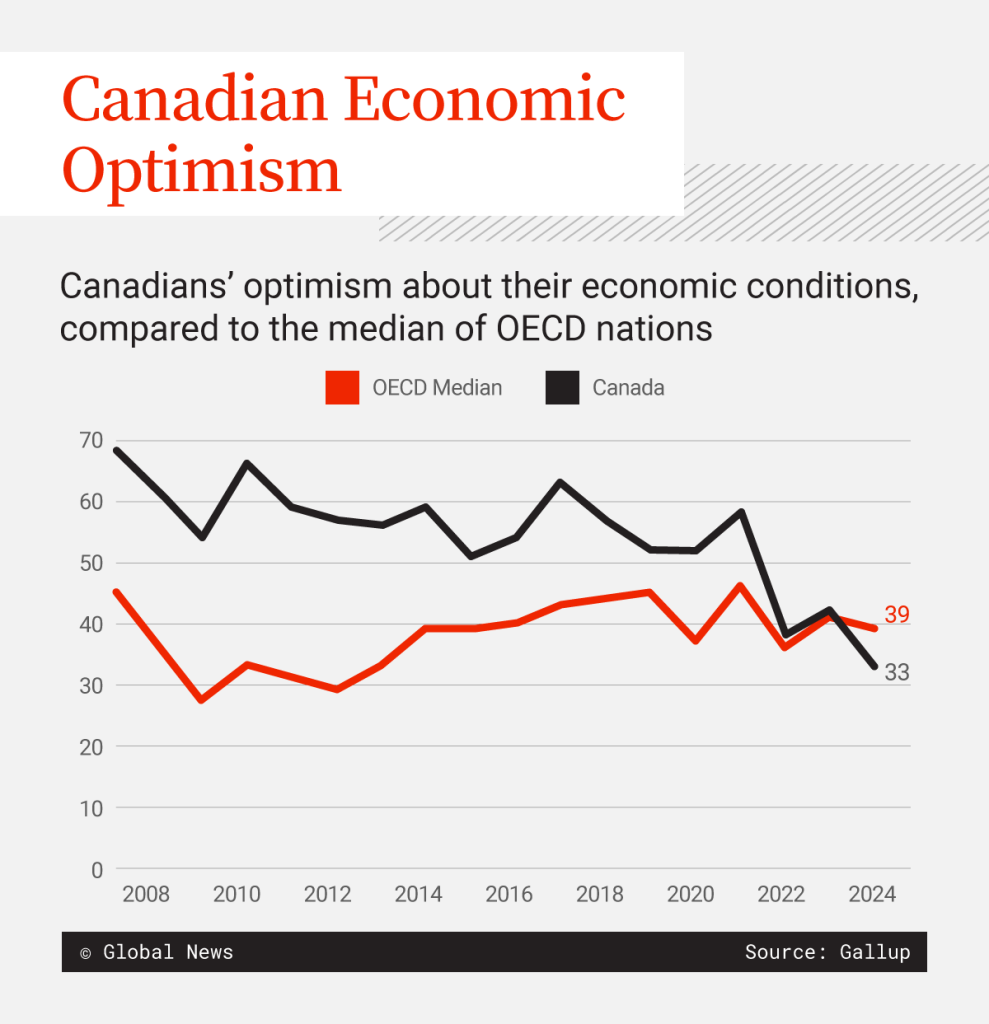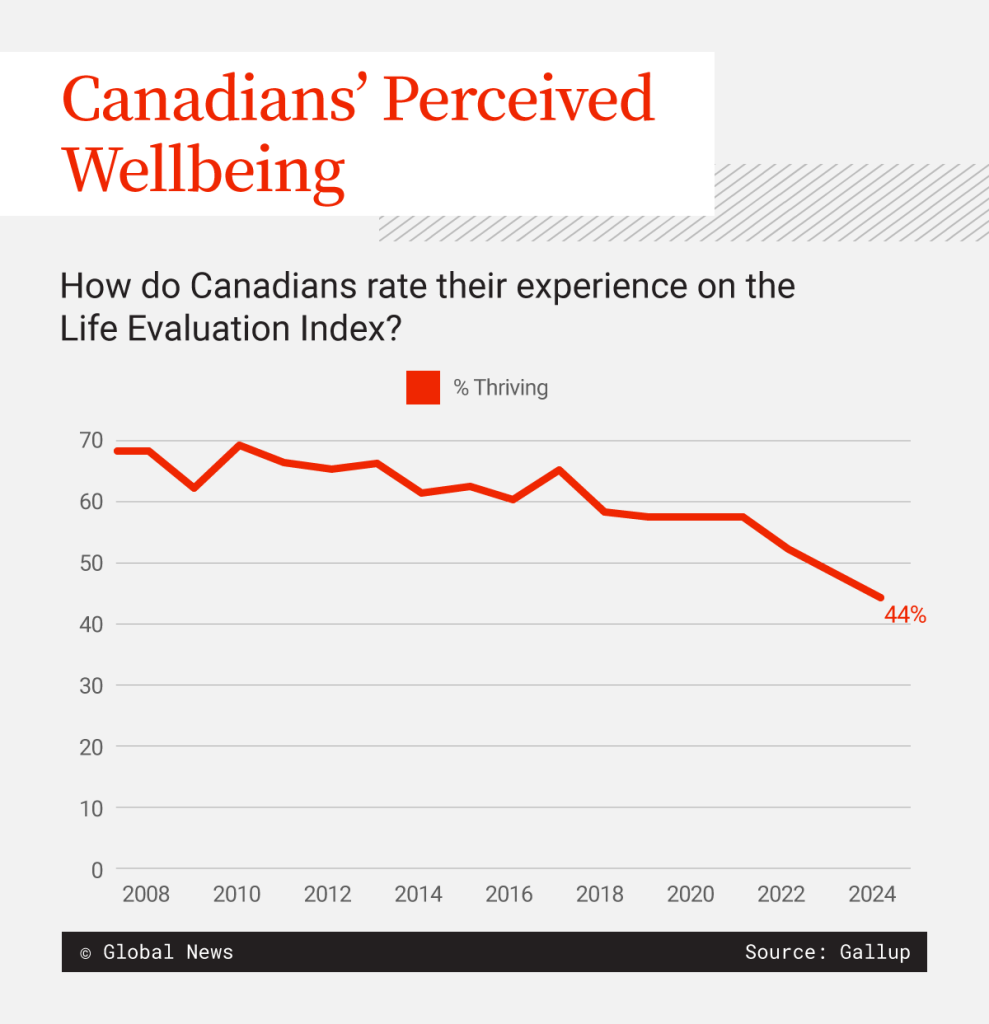Canadians are feeling record low levels of economic optimism and satisfaction in public services like housing and health care, a new analysis of Gallup polling suggests, presenting major challenges for whichever party forms government after the federal election.
Tuesday’s report, presented as a series of “tests” for Canada’s next prime minister, compiled nearly two decades of data collected annually from the pollster’s surveys of long-term issues in over 100 countries.
While the most recent polling was conducted months before U.S. President Donald Trump’s tariff policies caused further economic uncertainty, the report suggests declines in Canadian attitudes toward the economy and U.S. leadership have been persistent for years.
It also suggests the economic concerns highlighted in more recent Ipsos polling done exclusively for Global News, which shows cost of living is a top federal election issue, are rooted in more longstanding worries among Canadians.
“The cost of living and the housing crisis are widespread issues across many rich countries,” Benedict Vigers, who authored the report for Gallup, told Global News.
“But Canada is certainly up there amongst the declines, looking back over the last two decades of our trends.”
Vigers analyzed data from Gallup’s World Poll, which has surveyed 1,000 Canadian adults every summer since 2005, with similarly-sized polls conducted in more than 160 other countries. The results in Canada carry a 3.5 per cent margin of error.
The analysis found Canadians’ optimism about their economic condition — which for nearly two decades has been above the median of other advanced economies in the Organisation for Economic Co-operation and Development (OECD) — has plummeted since 2022.
Last year, that optimism reached a new record low, with just 33 per cent of those polled projecting confidence about their economic future.
It marked the first time in the World Poll’s history that Canada fell below the OECD median.

Gallup has also found similar declines among Canadians in its Life Evaluation Index, which measures respondents’ perceived well-being in the present and future.
After years of rating their lives positively, just 44 per cent of Canadians surveyed did so last year — another record low.
Earlier this month, the latest Ipsos Happiness Index also found Canada has seen one of the steepest drops in happiness since Ipsos began measuring it in 2011, behind just Turkey and South Korea.
Just 67 per cent of Canadians surveyed said they were happy, down from 80 per cent in 2021, with two-thirds saying their financial situation is behind their unhappiness.
An Ipsos poll conducted exclusively for Global News, released Sunday, found affordability and the cost of living is the top issue for voters in the current election. Respondents also identified housing availability and affordability, along with inflation and interest rates, as other top issues.

The Gallup report found Canadians’ satisfaction with the availability of affordable housing, while falling steadily over the past decade, has reached a new low of 22 per cent.
That number puts Canada more than 20 points below the OECD median, and also marks a sharp fall from 66 per cent satisfaction in 2010.
“That is one of the biggest slides or declines we’ve seen over the history of the Gallup World Poll amongst OECD countries,” Vigers said. “Declining by three times is quite a significant drop.”
The decline has largely coincided with the steady climb of housing prices in Canada, which have increased more than any other OECD nation since 2005 while accounting for inflation, according to Vigers’ analysis of OECD Real House Price Index data.

Only 50 per cent of Canadians said they were satisfied with the quality of health care in their communities in 2024, the lowest level since Gallup began tracking the issue in Canada, the polling found.
That came after satisfaction stayed steady at an average of 74 per cent between 2006 and 2021, before dropping sharply to 56 per cent in 2022.
The report also analyzed Canadians’ attitudes toward U.S. leadership since 2008.
While annual surveys found a majority of Canadians voiced approval during former president Barack Obama’s eight years in office, that plummeted when Trump took over in 2017, and stayed around just 20 per cent approval during his first term.
Despite a brief bump in former president Joe Biden’s first year in the White House in 2021, the rest of his term saw a majority of Canadians voicing disapproval.

Nearly 70 per cent of Canadians surveyed by Ipsos in February said they thought less of the U.S. as a country since Trump returned to power and began imposing tariffs on Canada.
Trump has also repeatedly said Canada should become part of the U.S., raising fears of annexation and Canadian anger toward America.
Conversely, Gallup has found American attitudes toward Canada has a country has stayed steady for many years, with between 80 and 90 per cent saying they felt favourable toward Canada. In February, that number was 89 per cent, topping American perceptions of other countries.
Vigers said the report’s findings suggest Canada’s next prime minister will face challenges addressing the long-term rise in economic pessimism among Canadians.
“In the next few years ahead, I think it will be very interesting to see how these trends change, whether some of them buck the trend or whether they continue to slide,” he said.
The data, he added, “paints quite a stark picture of the size of the problem.”
